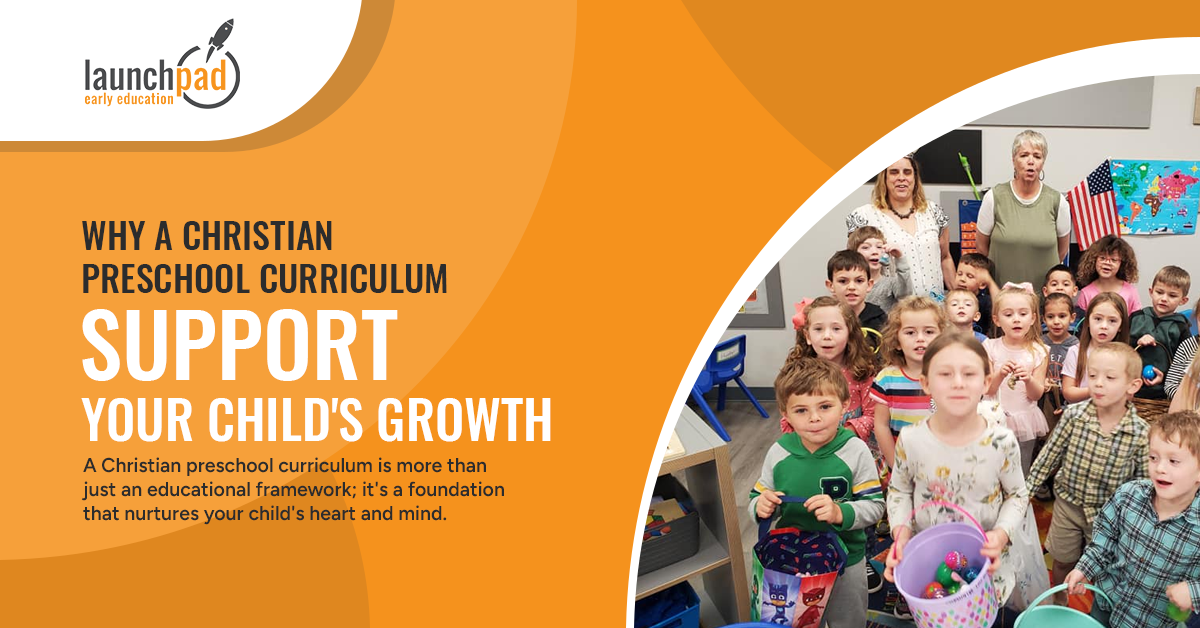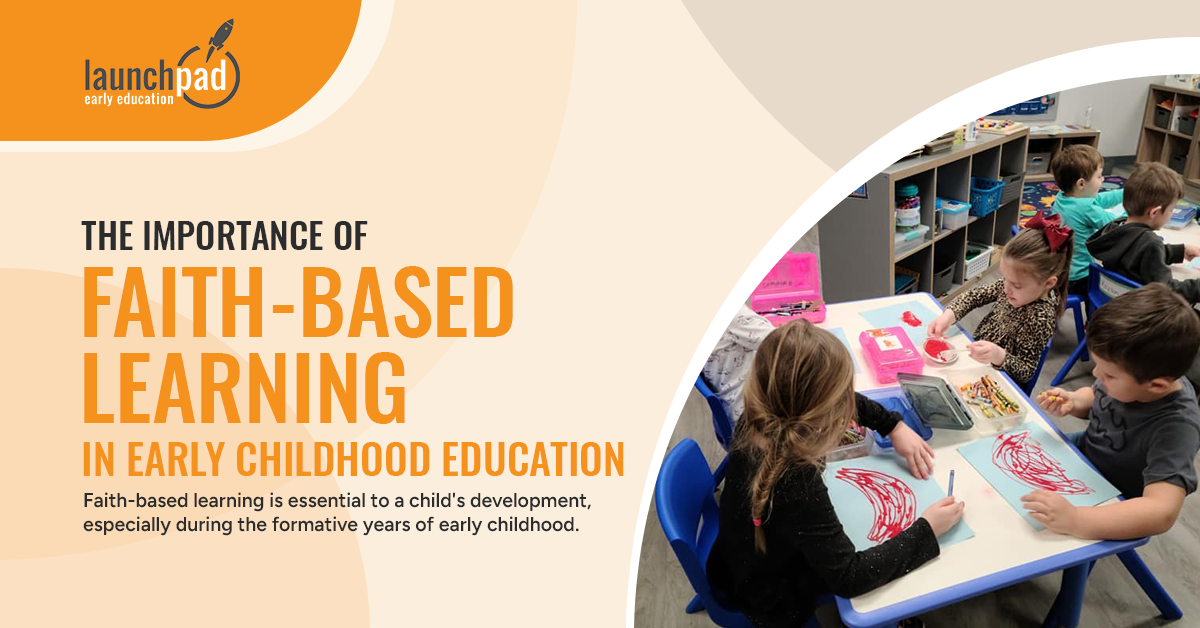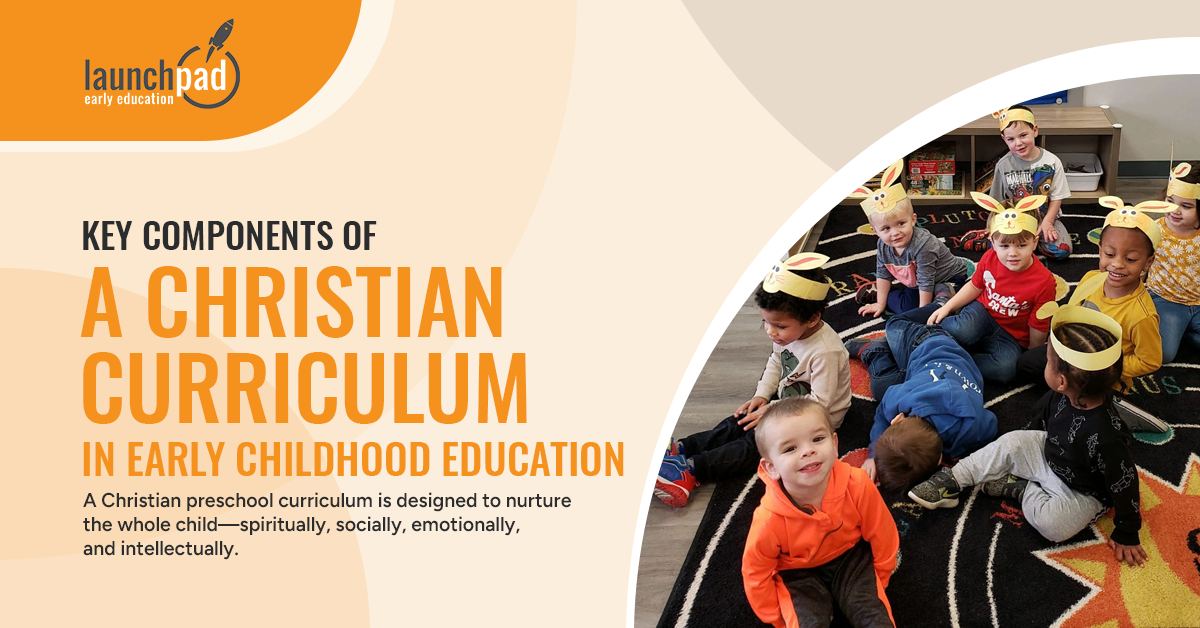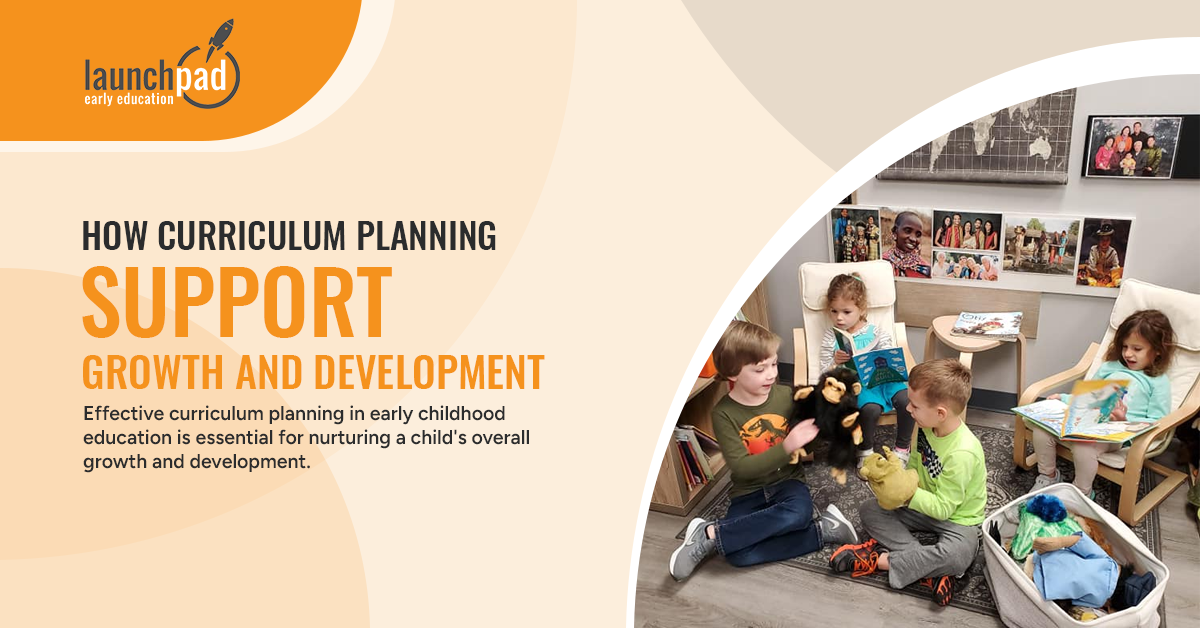A Christian preschool curriculum is more than just an educational framework; it’s a foundation that nurtures your child’s heart and mind. At LaunchPad Early Education, we believe in fostering a caring, faith-filled environment where children can grow spiritually, emotionally, and intellectually.
A Christian-centered approach integrates biblical teachings, helping young learners develop a strong sense of character, compassion, and purpose from an early age. Through stories, activities, and a supportive community, your child will experience a learning journey that builds faith while promoting cognitive development and social skills.
The Importance of Faith-Based Learning in Early Childhood Education
Faith-based learning is essential to a child’s development, especially during the formative years of early childhood. It lays the foundation for academic growth and helps foster a strong sense of values and character. At LaunchPad Early Education, we believe in nurturing the whole child—mind, body, and spirit—by integrating faith into every aspect of learning.
Building a Strong Moral Foundation
Faith-based learning provides children with a solid moral framework that helps guide their decisions, both in and outside the classroom. Children develop a thorough understanding of right and wrong by incorporating Christian principles such as kindness, patience, and honesty into everyday lessons. These lessons are vital in shaping a child’s character and guiding their interactions with others.
Some key aspects of a faith-based moral foundation include:
- Kindness and Compassion: Children are encouraged to treat others with respect and love, reflecting the values taught in the Bible.
- Honesty and Integrity: By learning the importance of truthfulness, children understand how to build trust and honesty in their relationships.
- Forgiveness and Conflict Resolution: Faith-based education promotes the ability to forgive and seek peaceful resolutions to conflicts, fostering a supportive environment for all.
These values form the cornerstone of a child’s character, influencing how they treat others and make decisions as they grow.
Developing Social and Emotional Skills
Social and emotional development is as important as academic growth in a faith-based learning environment. Through the lens of faith, children learn how to interact with their peers and control their emotions in healthy and productive ways. The Christian principles taught at LaunchPad Early Education encourage emotional growth alongside social skills, helping children form meaningful relationships.
Key social and emotional skills nurtured in a Christian preschool include:
- Empathy and Compassion: Children are taught to understand and care for the feelings of others, a key lesson in building strong friendships.
- Patience and Self-Regulation: Faith-based learning encourages children to practice patience and control over their emotions, promoting a calm and positive classroom atmosphere.
- Respect and Teamwork: Children develop strong teamwork and leadership skills by learning to respect others and collaborate in group settings.
These skills support children in their interactions with others and contribute to their overall emotional well-being.
Spiritual Growth from an Early Age
A Christian preschool curriculum allows children to explore their spirituality in a supportive environment. This early introduction to faith helps children understand their place in the world and the importance of God’s love. By engaging with stories, prayers, and songs, children form a personal connection to their faith that supports their emotional and intellectual growth.
Key elements of spiritual development in early childhood include:
- Biblical Teachings and Stories: Children are introduced to Bible stories that teach them valuable lessons about life, kindness, and faith.
- Prayer and Reflection: Through prayer and reflection, children learn to communicate with God and develop a sense of peace and gratitude.
- Community and Fellowship: A faith-based environment fosters a sense of belonging to a larger community, helping children feel supported and loved by peers and adults.
This early spiritual growth is foundational for building a lifelong relationship with faith, shaping children’s worldviews as they mature.
Key Components of a Christian Curriculum in Early Childhood Education
A Christian preschool curriculum is designed to nurture the whole child—spiritually, socially, emotionally, and intellectually. Integrating biblical teachings into early childhood education enhances cognitive development and provides children with a foundation of faith that will guide them through life.
Biblical Stories and Teachings
A core aspect of a Christian preschool curriculum is introducing children to the Bible. Biblical stories, teachings, and verses are integrated into daily activities, allowing children to learn about God’s love and the importance of living according to His word. These stories teach valuable lessons about kindness, forgiveness, honesty, and respect, essential for building strong moral character.
Key elements of biblical teachings in a preschool curriculum include:
- Bible Stories: Age-appropriate Bible stories, such as the story of Noah’s Ark or David and Goliath, help children understand themes of faith, bravery, and trust in God.
- Memory Verses: Simple Bible verses are taught to help children commit scripture to memory, building a spiritual foundation.
- Faith-Inspired Lessons: Everyday lessons are infused with Christian values, helping children see the connection between faith and daily actions.
Through these stories and teachings, children internalize Christian values that will influence their behavior and relationships as they grow.
Practical Applications of Faith
While biblical teachings are essential, a Christian preschool curriculum also emphasizes the practical application of faith in daily life. Children learn how to express love, gratitude, and kindness to those around them, tangibly embodying the teachings of Jesus. This helps children grow spiritually and develop essential social and emotional skills.
Key practical applications of faith in preschool education include:
- Acts of Kindness: Encouraging children to perform simple acts of kindness, such as aiding others, sharing toys, or showing empathy, reinforces Christian values.
- Respecting Others: Teaching children to respect their peers, teachers, and families, helping them build strong relationships based on mutual understanding.
- Fostering Gratitude: Encouraging children to express gratitude in daily activities, such as thanking God for blessings or showing appreciation to others.
These practical lessons help children learn how to apply Christian teachings in real-world situations, shaping their behavior and emotional growth.
Activities that Support Faith and Learning
A Christian preschool curriculum incorporates engaging, hands-on activities promoting spiritual and academic growth. These activities are fun and interactive while reinforcing Christian principles. Children participate in arts and crafts, songs, and group games that teach them about God’s love, creation, and the values of community and service.
Examples of activities that support faith and learning include:
- Christian Songs and Music: Singing songs with spiritual messages teaches children about worship, joy, and the love of God in a fun, engaging way.
- Art and Crafts: Creative projects like making “thankful” tree branches or Bible story-themed crafts help children express their faith visually while developing fine motor skills.
- Group Play and Cooperation: Activities that encourage teamwork, such as building a “Bible story scene” together, promote collaboration, and teach the importance of working with others.
These activities support academic growth and children’s spiritual and social development, creating a well-rounded educational experience.
How Curriculum Planning Supports Growth and Development
Effective curriculum planning in early childhood education is essential for nurturing a child’s overall growth and development. It provides the structure and intentionality needed to address a child’s academic, social, emotional, and spiritual needs. LaunchPad Early Education’s curriculum fosters cognitive skills and personal growth rooted in the Christian faith, ensuring that every aspect of a child’s development is holistically supported.
Tailored Learning for Individual Needs
Curriculum planning in a Christian preschool setting centers on understanding and meeting each child’s unique learning needs. Every child develops at their own pace, so creating an environment that supports their learning styles is important. By observing each child’s strengths and challenges, teachers can adjust their teaching strategies and activities to help each child thrive.
The key strategies for tailoring curriculum to meet individual needs include:
- Observation and Assessment: Regular assessments help teachers understand where each child is in their learning journey, allowing for targeted support.
- Flexible Teaching Approaches: Teachers can adapt their methods, providing more hands-on activities or quiet reflection time based on each child’s learning style.
- Faith Integration: Christian teachings are woven into lessons, allowing each child to grow in faith while developing academically.
This tailored approach helps meet each child’s needs, promoting academic success and spiritual growth.
Focus on Cognitive and Social Development
A well-planned curriculum emphasizes cognitive and social development, ensuring that children acquire the foundational skills they need for future academic success while learning essential social and emotional skills. Faith-based lessons naturally blend with educational content, creating a rich, holistic learning environment where children grow intellectually and socially.
Key aspects of cognitive and social development supported by curriculum planning include:
- Early Literacy and Math Skills: To build academic skills, bible stories, counting games, and letter recognition activities are incorporated.
- Problem-Solving and Critical Thinking: Activities like puzzles and group projects help children develop the ability to think critically and solve problems.
- Social Skills and Empathy: Through group work and Christian-based teachings, children learn the importance of sharing, caring for others, and working together.
By integrating these developmental components, the curriculum promotes a well-rounded education that intellectually and socially nurtures children.
Encouraging Lifelong Learning and Faith
Curriculum planning also plays a key role in fostering a deep connection to faith. Children must understand learning is not limited to their academic growth but extends into their spiritual journey. A Christian-centered curriculum encourages children to view learning as a lifelong pursuit beyond the classroom, promoting curiosity and a strong foundation of faith.
Ways that curriculum planning encourages lifelong learning and faith include:
- Fostering Curiosity: Teachers encourage children to ask questions and explore, instilling a sense of wonder and a love for discovery.
- Building Confidence: As children achieve academic and spiritual milestones, they gain confidence in their capabilities and develop a sense of independence.
- Faith-Focused Activities: Daily prayers, Bible stories, and spiritual songs keep children engaged with their faith, reinforcing the importance of God in their lives.
These elements help children excel academically and grow in their faith, creating a lifelong foundation for continued learning and spiritual growth.
Conclusion
At LaunchPad Early Education, we are passionate about providing a nurturing and faith-centered environment that supports every child’s growth and development. Our Christian preschool curriculum lays the foundation for a lifetime of learning, compassion, and faith by integrating biblical teachings, individualized learning, and a focus on academic and spiritual growth. Every child deserves the opportunity to thrive, and through careful curriculum planning, we ensure they are equipped with the skills and values they need to succeed in both the classroom and life.
Contact us today if you’re ready to see how our Christian preschool curriculum can help your child grow spiritually and academically! Visit https://launchpad-ee.com/ or give us a call at (615) 809-2211. We can’t wait to welcome your child to our community!





